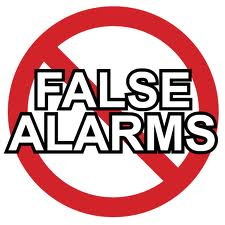Home / False Alarm Prevention

An alarm system can bring you a sense of security and peace of mind and is effective with proper installation, adequate training and regular maintenance.
The definition of a false alarm is any signal notification of any alarm condition to the local authorities when the responders find no evidence of criminal offense or attempted criminal offense. In the case of Fire Alarms, any activation of the system that is caused by misuse, negligence or an intentional act where the local department is dispatched and the activation is not caused by smoke, heat or an actual fire.
While there are many ways to reduce or eliminate false alarms, we have listed the most common causes and ways to correct them.
Alarm Systems like anything else that operates 24 hours a day, seven days a week, periodic maintenance is needed to keep the system at peak operating performance. All systems should have a main backup battery and that battery should be changed every 3 to 5 years. The longer the battery is in service, the less backup time you will have when you are in a power failure situation. Make sure your system is available to operate properly when you need it.
Low batteries are the most common equipment reason for false alarm activation’s.
Make sure that those who will use your system are properly trained to do so. If you allow maintenance workers, cleaning crews, or even house sitters access to your home of facility, make sure they have proper training, codes and even a password for the system should they need to cancel an alarm. Give those people our telephone number so they can reach us in the event of a service emergency should you be away for any period of time.
Your information on file with us needs to be correct and should be reviewed at least once per year to make sure that telephone and cellphone numbers are updated as you change devices. Keep out information stored in your cell phone to contact us in an emergency. Our communications people are always online and you can request to be connected to a technician at any time for an emergency.
If you change your email address, notify us so that when we send out important updated information, you will be sure to get it.
Always ensure that hanging or moving decorations will not activate motion detectors, especially when heating systems come on.
Before rearranging your furniture or putting up the new spring curtains or drapes, first determine whether the design change would interfere with the operation of your motion detectors.
Contact us prior to starting any remodeling project. You will need to work with us to make sure the remodeling process does not cause false alarms and that your system will continue to work properly after the work is completed. If we monitor your system there is no charge to have a consultant visit your faciltiy to discuss the changes with you.
There are many programming options that are built into all of the alarm systems that we install here at Advanced Alarm Systems. Talk to us about any special concerns that you may have and in all likelihood we have a very simple programming solution that will take care of your needs.
NO. Power surges and lightning strikes should not cause false alarms! False alarms caused by lightning strikes are controllable through the proper grounding of alarm systems and the use of power AND phone line surge suppressors. Use of surge suppressors greatly reduces false alarms by redirecting and dissipating electrical current to the ground. Power outages or interruption of power should not cause false alarms!
Advanced Alarm Systems Inc.
101 Lindsey Street
Fall River, MA 02720
Phone: 1-800-44-ALARM
Fax: 508-324-9005
E-mail: info@advancedalarmsystems.com